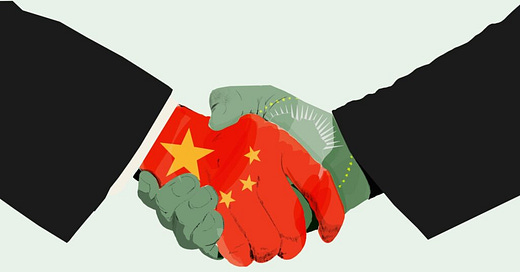The Majority of international investors see Africa as an important reservoir of minerals and are attracted by Angolan and Nigerian oil, copper from DR Congo and Zambia and Namibian uranium. However, while Europeans and Americans perceive the continent as a worrying source of instability, migration, and terrorism, China prefers to focus on its opportunities. Besides, relations between China and Africa have never been stronger than in the last fifteen years. Indeed, the level of China’s engagement with the continent has reached unprecedented levels. This breaking of the ice is being led by both public and private companies, political decision-makers and diplomats, and might be as much the result of spontaneous actions as it is of a well-orchestrated strategy by Beijing.
A win-win system? The debate has begun.
Firstly, this interest in the continent goes far beyond raw materials. The evidence lies in the fact that while the United States invests 66% of its total foreign investment into mining, China contrastingly utilizes a mere 28%. The reality is that China is also attracted to Africa by the large consumer market it provides for the Chinese manufacturers and construction companies. Ethiopia perfectly illustrates this point as it boasts of a population of more than 100 million - the second largest on the continent after Nigeria - and is strategically located at the Horn of Africa. Ethiopia has been growing steadily for nearly a decade and, despite its natural resource poverty, has become a major destination for Chinese investment.
Secondly, China has used the continent as a kind of laboratory for its growing international ambitions. Furthermore, the multi-dimensional nature of its approach is often not recognized, whether in its participation in peacekeeping operations or in the construction of roads, ports and railways to link developing nations to China via a new Silk Road. A few figures illustrate this: in 2000, Sino-African trade was estimated at $10 billion, according to the Johns Hopkins School of Advanced International Studies in Washington. In 2014, it reached $220 billion, before falling due to the fall in commodity prices.
Nevertheless, from an African perspective, although it may involve many risks, the partnership with China brings tangible benefits in terms of financing and infrastructure. And, most importantly, it offers a welcome choice for African governments, which for decades have developed often unproductive relationships with international donors. The construction of infrastructure is a priority for the African governments, which Chinese companies have well-understood. Their expertise in this field and the principle of tied aid have enabled them to win contracts in Africa in the fields of energy, telecommunications, hydraulics, etc. But this multiplication of construction still raises many questions concerning the quality of the infrastructure delivered (non-compliance with standards, rapid deterioration), the problems of corruption along with its environmental and social consequences such as river pollution and population displacement in the case of dams. Similarly, China's official non-interventionist policy makes it even more attractive to African leaders, who might be fed up with the "lesson-giving" attitude of the former colonial powers with regard to human rights and democracy.
The rise of new technologies has led to the loosening of the reigns of state control in many sectors allowing African entrepreneurs to thrive independent of government support and political connections. Additionally, many confident young Africans who have emerged from their classrooms have studied abroad, usually in Europe or the United States, but increasingly in China. Subsequently, Africa is now seeing the emergence of an entrepreneurial class that is driving and shaping the economic growth of the entire continent.
On the other hand, African governments are becoming more and more indebted to China forcing them to pledge their political and economic independence. For instance, Kenya has benefited from Chinese aid - worth billions of dollars - and engineering expertise to improve its infrastructure. However, Kenya's debt recently passed the 5 trillion shillings ($49 billion) mark and 72% of this amount is owed to China. The risk is high for these countries and has even caused heads of state such as President Uhuru Kenyatta of Kenya to express concern about Africa’s trade deficit with China in a recent interview with the Financial Times. On top of that, although they have a positive outlook overall, the enthusiasm of yesteryear has given way to a certain reserve. While the infrastructure is well received, public opinion insists on the need to demand that Chinese companies employ more local labor and provide them with good treatment.
This leads me to ask whether this Sino-African economic and trade partnership really "win-win" as the Chinese claim? The answer remains unclear. However, it is known that galvanized by its formidable economic growth and driven by its desperate search for raw materials and new markets as well as its desire to increase its sphere of influence, China would make the mere pursuit of its interests take precedence over all other considerations. Therefore, it is vital that African governments regain control of their relations with their foreign partners, whether in the West or in China. This means setting priorities, insisting on knowledge transfer and negotiating on their own terms.
Africans need to be clear about who plays what role. It's up to them, not outsiders, to decide.



